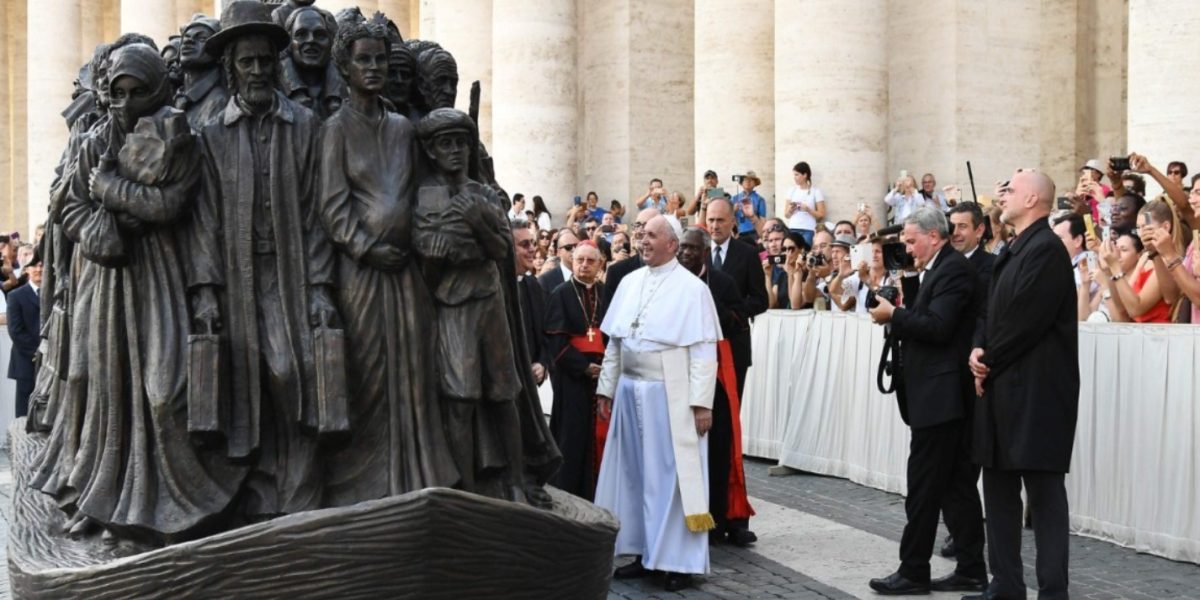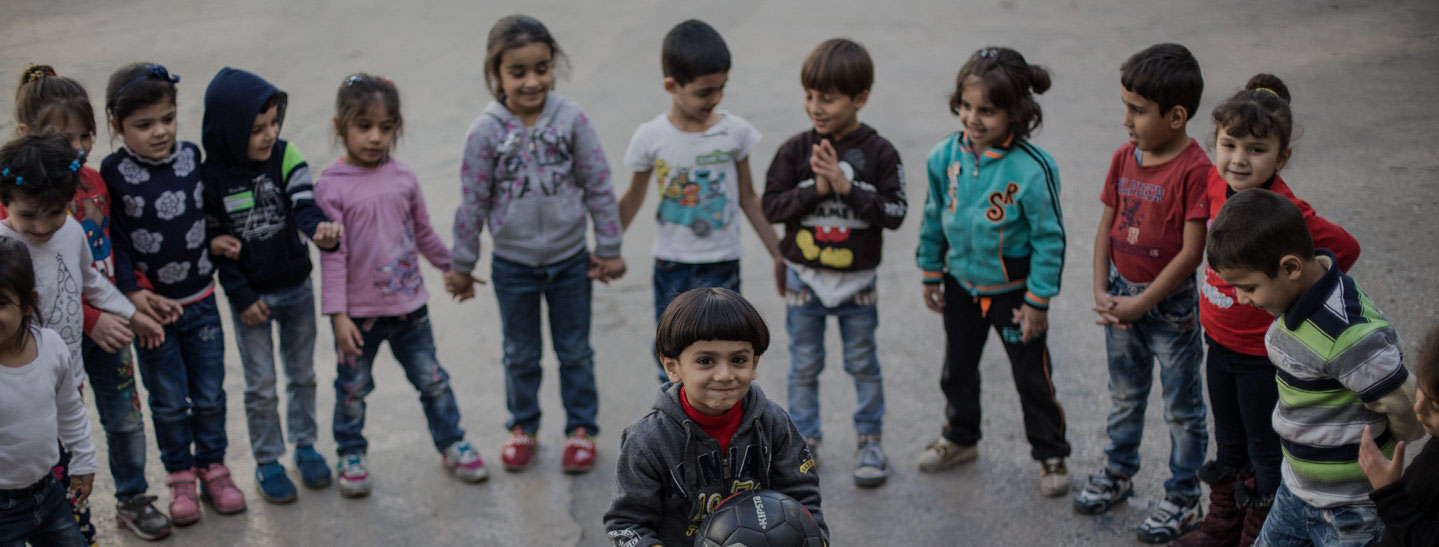Message of JRS on the Occasion of World Day of Migrants and Refugees
16 February 2026

Message on the Occasion of World Day of Migrants and Refugees
On Sunday, September 29, 2024, the Catholic Church will commemorate the 110th World Day of Migrants and Refugees. In a message titled “God Walks with His People,” Pope Francis invites us to see in the migrants of our time the image of the people of Israel during the time of Moses, who also fled from oppression and exploitation, insecurity and discrimination, and a lack of prospects for development. Moreover, the Pope explains that God is not only with His people but also among His people, identifying with migrants, especially with the last, the poor, and the excluded. This is a message that inspires and encourages us, particularly in this time when fear of migrants is intensifying in Europe, when more and more countries are closing their borders, while rarely reflecting on the situations from which migrants flee, and where the discourse of solidarity and hospitality is unpopular. This day, however, encourages us to approach the challenging reality of contemporary migration from a Christian perspective, in which we are all sisters and brothers of equal dignity.
The events and conditions that drive forced migration are numerous, and the world has not been able to sufficiently address and resolve them. We are witnessing many wars and conflicts, religious and political persecutions, climate change, social injustice, and extreme poverty. At the Jesuit Refugee Service, an organization operating in 58 countries, accompanying, serving, and advocating for the needs of forcibly displaced persons, we clearly see that the greatest contribution we can make in such a global situation is the promotion of a culture of shared responsibility and active engagement for people in need. The world has sufficient resources to help all those forced to migrate, but it is necessary not to close our eyes and turn away, but rather “to the extent we are able, to welcome the foreigner in search of the security and the means of livelihood which he cannot find in his country of origin.” (Catechism of the Catholic Church, 2241). For over a decade now, an increasing number of asylum seekers have been arriving in Europe. Our geographic location dictates that tens of thousands of people pass through our regions in search of a better future in the West. Alongside them, there is also an increasing number of foreign workers, who are increasingly coming from distant countries with different cultures and customs. These phenomena cause fear and anxiety for many of our fellow citizens, which, as in other countries, can easily be exploited for cheap political points (cf. Fratelli tutti, 39).
Although every nation is obliged to protect its independence and uniqueness, we must not forget that the planet belongs to all of humanity, and that no one is obligated to live with less dignity simply because they were born in a place lacking natural resources or less developed (cf. Evangelii Gaudium, 190). Fortunately, there are no strong voices in our public discourse currently advocating for a closed and self-sufficient nation. In fact, a society that would protect itself from migrants with material or invisible walls and fences would actually morally and spiritually impoverish itself (cf. Fratelli tutti, 27). However, we are concerned about the lack of initiatives aimed at integrating migrants and sensitizing society to the phenomenon of contemporary migration. It seems that as a society, we have not yet succeeded in what Pope Benedict strongly warned about—that “foreign workers should not be treated as disposable goods or mere labor force” (Caritas in veritate, 62). The absence of integration policies and strategies results in the stigmatization and ghettoization of foreigners, and such passivity must be resisted. Inaction creates circumstances that foster racism and xenophobia among the local population and frustration and radicalization among foreigners. On the other hand, it is necessary to invest in religious literacy, so that it becomes clear that neither exclusivity nor terrorism is conditioned by religion, but rather instrumentalized, used for purposes completely opposite to its principles (cf. Document on Human Fraternity for World Peace and Living Together). The new circumstances in which we find ourselves as a society, requiring the contribution of migrants and a society capable of providing protection to those in need, demand appropriate formation and focus on new challenges. Through our projects to raise public awareness and encourage volunteerism, we strive to contribute in this direction also in our organization.
The fundamental Christian attitude is one of openness to others. We are called to recognize and respect not only our own needs but also to be sensitive to the needs of all people of our time, especially the poor or in any way afflicted (cf. Gaudium et spes, 1). Migrants passing through our regions should remind us of the great gift of the prosperity we enjoy, but also of how it gives us responsibility to help others who are less fortunate. The solidarity we have shown toward Ukrainian refugees demonstrates that we have both the will and the material capacity to do so. Therefore, it would be beneficial to develop a strategy of solidarity toward forcibly displaced people at the state level, determining how many people and in what way, in regular and extraordinary situations, we can help find refuge in our country. Given Croatia’s current material circumstances, we are certainly capable of providing refuge for more than the forty or so people per year who, on average, have been granted asylum or subsidiary protection in recent years. For refugee integration to be effective, in addition to state support, it is essential that all social actors, especially church communities, promote solidarity and unity, and be ready to help with integration and build a culture of welcome (cf. Pope Francis, address during the Angelus on World Day of Migrants and Refugees 2023). Indeed, it is through our attitude toward migrants and refugees that we affirm the fundamental belief in the inalienable dignity of every human person, regardless of origin, race, or religion (cf. Declaration Dignitas Infinita, 40).
Christians are particularly called to develop a culture of encounter and solidarity, following the example of Christ, who prioritized those rejected by society. We must resist the temptation of fear and populism and demand policies that respect the dignity and rights of migrants and refugees. It should not be acceptable to us that violence is perpetrated against asylum seekers at our borders, or that the fate of people is left in the hands of smugglers profiting from the misery of these unfortunate individuals. Therefore, it is necessary to promote safe and legal pathways for those seeking refuge, such as humanitarian visas, work permits, family reunification, student grants, and sponsored arrivals (cf. Pope’s message for World Day of Migrants and Refugees 2018). Church organizations in many countries are involved in such projects, and through parish communities, they provide care and support to refugees during the initial period of integration. We hope that such initiatives will soon be implemented in Croatia as well.
The phenomenon of migration is so large today that no country can handle it on its own. However, this very circumstance points to the indispensability of solidarity and the need for shared responsibility to protect and help these people. We are all in the same boat and cannot ignore those beside us (Pope Francis during his visit to the refugee camp on Lesbos 2021). We must work towards creating a society where every person, regardless of their origin, can find safety, hope, and the opportunity for a better future. Migrants and refugees are not just victims; they are also agents of change, bearers of different cultures, skills, and talents that can enrich our community (cf. Pope’s message for World Day of Migrants and Refugees 2022). Therefore, in the spirit of unity and solidarity, we invite everyone to build bridges of understanding and compassion so that the hardships of forcibly displaced people may meet with our empathy and concrete engagement. Let this World Day of Migrants and Refugees serve as a reminder that we collectively strive for a world where everyone can live with dignity and hope, and thus believe that “God walks with His people.”

